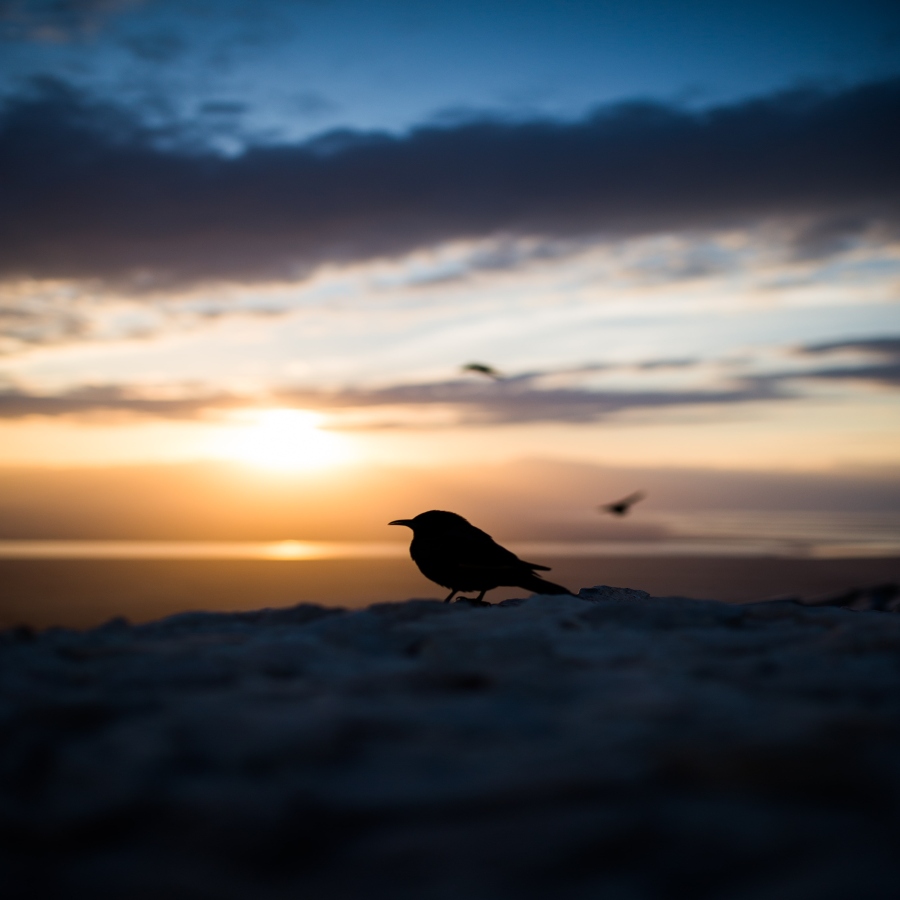The bluegrass is dry and sick.
“You were the one who survived,” I say. “You were very fortunate.”
You are an expert forager, combing the orchard for chokecherries and fallen apples. The summer worms are desiccated and flat, but you capture a young garter snake in a silted patch of creek bed. We feast. I marvel. I do not have to teach you to be brave.
My first hatchlings were stillborn.
I am not prepared to hear your first song—light, liquid bursts of music, ascending phrases slurred like your dead father’s chatter.
“Tell me a story about when you were young,” you say.
It is the first time I see myself as not being young. We are bathing together in the amber creek, sycamore and ash leaves crowding my reflection.
“I wanted to fly to the sun.”
“That’s silly,” you say. Then, sotto voce, “Did you ever try?”
If I could smile, I would.
I clear a small opening of leaves. Dive to the creek’s dirty bottom. The current moves me downstream, and I do not resist. Movement is a relief.
The worms are wintering underground when I tell the story of your father’s death.
“Still water possesses dark magic,” I say. “He didn’t recognize himself. So strong was his instinct to defend the nest.”
I don’t tell you how badly he beat himself, that it wasn’t the first time he’d done it. It is not uncommon for a father to pulverize himself against a closed window, convinced he is slaughtering his rival. He is not entirely wrong.
Your first frost comes early. I teach you how to preen for winter, how to oil each vane.
I tell you that you will bring the spring. It is in your blood.
I don’t tell you about the autumn a swan killed my young mother or that this is my final winter.
I don’t tell you I am terrified for you, or that I wasn’t hatched from an egg, not entirely.
My origin story is a passing away, a nagging memory. Incantations and silphium and bloodwort. Thistle wreaths and possession and protection charms. A seductive feast of worms. A girl desecrated and deplumed on the bank of a river. Murdered by a swan for her soft womb.
A father cannot sew life back into his dead mother’s belly, but he can procure another bird’s shell and suffocate life into animation.
“Dark magic is not our only predator.”
You are the one who notices my afterfeathers are brittle, splitting like cambium beneath a blade of frost. I’ve ceased to molt, and upon awakening, I can hardly fly. You stay with me through the winter, but your restlessness is palpable.
We are eating a modest meal of holly berries and snow when you ask what the first spring without me will be like.
“A mate will find you, and you will breed. You will build the nest. You will give birth, more than once, maybe in the barn, maybe in the crotch of this sturdy Cortland. Some eggs will be speckled, some will be plain. Most will not survive.”
Your feathers are less downy now, more elongated and gray. I can’t make out the spots on your breast anymore. I am so small next to you, my last child.
“How will they die?”
“You will lose them to the crows. To the snow. Every loss will try to ground you. But you are strong. You defy gravity. You harness wind.”
On the morning of my death, I wake to the sound of screeching. It is a sound I have made, one that rattled the elm leaves the night I was born. I have never taught you this sound.
Whoever he is, he left evidence. Deep claw marks in the soft bark of our tree. Fresh mudding and needles and grass for construction.
I hear your desperate flapping somewhere. His wildness upon you beyond the bare rows of orchard. Each violent wing stroke recalls your conception. The percussion of hollow bones. Blood scent on my flightless wings. The nest built too low to the ground. “You are fortunate,” he had told me afterward. “You will bring the spring now.”
It is quiet morning again.
You return with a piece of black yarn and begin bundling the mud and grass. Your feathers are slick and disheveled. You work quickly, uncharacteristically distant. You know I am watching, but you do not meet my gaze.
You finish securing the yarn and then hurl yourself, all fit and feathers and dew, into the air you love so much. My sight is failing. You. Gone and then there. I can barely see you—a vision—alighting on the highest branch, heartbroken, far from reach.
Dawn blushes life into your breast.
I want to warn you about the worms and their aphrodisia. I want to teach you how to prepare hemlock in the case of emergency. But you’re contemplating the distance to the sun, calculating dates using the rime’s thickness, searching for your magic’s color in the snow vapor.
You are no longer mine.

